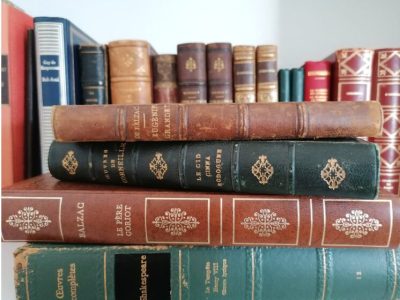Guy de Maupassant remains one of the most remarkable figures of 19th century French literature. His prolific work, marked by realism and psychological finesse, continues to influence generations of writers. In this text, we will delve into the life, work, and literary legacy of Maupassant.
The life of Maupassant
Guy de Maupassant was born on August 5, 1850 in Tourville-sur-Arques, a small village in Normandy, into a family of the lower nobility. He thus evolved in an environment marked by the traditions and values of his social environment and a particularly rich regional culture. This immersion in a provincial society, far from the splendor of Paris, profoundly influenced his vision of French civilization.
After studying at the Lycée Louis-le-Grand in Paris, Maupassant, however, had the opportunity to immerse himself in the intellectual excitement of the French capital: it was there that he made the decisive meeting with Gustave Flaubert, a renowned writer who would become his mentor. Under the tutelage of Flaubert, Maupassant refined his view of French society, learning to observe the smallest details of everyday life to better transcribe them in his works.
During his first steps in working life, Maupassant was confronted with bureaucracy and the routine of administrative work. This experience allowed him to understand the workings of French society, its social classes, its hierarchies and its aspirations. These careful observations, combined with his own experiences, nourished his imagination and provided him with raw material for his future stories.
The Work of Maupassant
Guy de Maupassant, through his vast and varied work, remains a pillar of French realistic literature. Mainly known for his short stories, he excels in the art of depicting daily life in 19th century France with striking precision. His stories, imbued with his lucid view of society, explore a multitude of themes and situations, thus offering a living portrait of the French civilization of his time.
“Boule de Suif”, one of his most famous short stories, perfectly illustrates his talent for denouncing a certain social hypocrisy: by featuring varied characters, from different social classes, Maupassant exposes the tensions and contradictions of the French company of the time.
In his novel “Bel-Ami”, Maupassant explores the workings of ambition and corruption in Paris at the end of the 19th century. Through the character of Georges Duroy, an unscrupulous careerist, he offers a scathing critique of bourgeois society and its moral values. “Le Horla”, for its part, marks a turning point in Maupassant’s work by exploring the themes of madness and the perception of reality. This fantastic short story, where the narrator is haunted by inexplicable hallucinations, demonstrates his talent for playing with the boundaries between reality and imagination.

key themes
Through his abundant work, Guy de Maupassant explores a multitude of themes that resonate with 19th century French society and thus offers the reader the opportunity to discover a part of French history. The human condition occupies a central place in Maupassant’s work: the writer thus realistically depicts the aspirations, weaknesses and torments of his characters, whether they come from the Parisian bourgeoisie or the provincial working class. It thus offers a gallery of living portraits, where unfulfilled dreams, devouring passions and cruel disillusionments mingle.
Vanity is another recurring theme in Maupassant’s work. Through his stories, he ironically denounces the obsession with appearance and the disastrous consequences of the incessant quest for social recognition. “La Parure”, Maupassant’s emblematic short story, offers a poignant illustration of this theme, where a woman sacrifices everything for appearance and suffers the terrible consequences.
Other inexhaustible themes, greed and corruption are also frequently explored with finesse by Maupassant. In “Bel-Ami”, he highlights the shenanigans and moral compromises that an ambitious careerist is willing to engage in to climb the ranks of Parisian society. This harsh criticism of bourgeois values reveals Maupassant’s uncompromising view of human nature and its failings, the work remaining today a reference for lovers of French literature.
Literary style
Maupassant’s literary style is characterized by its elegant simplicity and almost “surgical” precision, making him one of the undisputed masters of 19th century French literature. At a time when certain authors favored grandiloquence and linguistic ornaments, Maupassant opted for spare prose, direct, but no less powerful.
His writing, free from embellishments, goes straight to the point, captivating the reader from the first lines with its clarity and effectiveness. Each word, each sentence is carefully chosen to serve the story and the characters, without ever weighing down the text. This economy of means gives his works a remarkable intensity, allowing total immersion in the universe he depicts.
Maupassant also excels in the art of dialogue, offering authentic and impactful exchanges between his characters. These dialogues, imbued with the spoken language of the time, help to bring his stories to life and create a characteristic realistic and immersive atmosphere. Through his attention to detail and his ability to accurately render the nuances of language, Maupassant places his style in line with the great tradition of French literature.
Ultimately, Maupassant’s refined and effective style testifies to his mastery of the art of writing and his desire to place the story and the characters at the heart of his work. His fluid, unadorned prose continues to captivate readers around the world, making him one of the emblematic figures of French literature and a model for future writers.
An heritage intertwined with French culture
Maupassant’s literary legacy still resonates today in French civilization and well beyond. His work, anchored in the reality of 19th century France, offers a precious testimony to the morals, values and concerns of his time. Through his ability to plumb the depths of the human soul and explore the workings of society, Maupassant left an indelible mark on French literature.
His sharp look at the human condition and his lucid critique of bourgeois society also opened the way to a new form of realism in literature, influencing many writers to come. The themes addressed by Maupassant, such as vanity, ambition, solitude and madness, still resonate powerfully in contemporary French civilization, offering a timeless reflection on the dilemmas and paradoxes of human existence.
By exploring the twists and turns of the human soul and accurately depicting the failings of society, Maupassant has contributed to enriching our understanding of human nature and the complexity of social relations. His literary legacy, although born in the 19th century, continues to inspire and captivate readers around the world, making him one of the most influential writers of French civilization and a true monument of universal literature.











